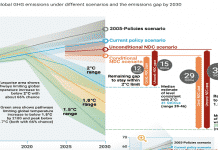The Cabinet Committee on Economic Affairs (CCEA) Chaired by the Prime Minister Shri Narendra Modi has approved the following proposals on November 27, 2019. The approval in detail are as follows, FCI authorized capital increased to Rs. 10,000 crores from Rs.3500 crore:
FCI authorized capital increased to Rs. 10,000 crores from Rs.3500 crore:
The CCEA has given its approval for increasing its authorized capital of Food Corporation of India (FCI) from existing Rs. 3,500 crores to Rs. 10,000 crores. With the increase in authorised capital, additional equity capital can be infused in FCI through union budget. This will help in funding foodgrains stock, held by FCI and will also help in reducing the borrowing by FCI.
Key Points:
i.FCI maintains stock of foodgrains funded by the govt through long term loan or through equity. The paid up equity capital of FCI is Rs. 3,337.58 crores.
ii.FCI: FCI was formed under Food Corporations Act, 1964. Its primary objective is to ensure Minimum Support Price(MSP) to farmers, maintain buffer stock of foodgrains and distribution of foodgrains under National Food Security Act 1980.
Waiver of loan repayment against Sikkim Mining Corporation:
The CCEA has given its assent to waive the loan repayment worth Rs 54 lakh and interest thereon amounting to Rs.370.40 lakh, (totally Rs. 424.40 lakhs i.e., about Rs 4 crores) against the Sikkim Mining Corporation(SMC). Further, interest on principal loan will be extinguished and the liquidation process of the Corporation will also get completed.
SMC Background:
- SMC was established on 27th February 1960. It was a joint venture undertaking of Sikkim govt and the govt of India.
- It underwent loss since its inception. To overcome this, a consultant was engaged in 1999.
- However, recommendation of Accountant General of Sikkim, and advice tendered by the erstwhile planning commission, both the partners (Sikkim govt and central govt) engaged a consultant to spell out a road map for the future of the corporation in 2003.
- Closure of SMC: On the basis of the report of the consultant & 107th Report of Public Accounts Committee (PAC) of State Legislative Assembly of Sikkim, State and Central Govts took joint decision to close down the mining operations of the SMC and to settle all its dues and liabilities.
- Liabilities of the corporation to the tune of Rs.685.60 lakhs towards the State Government of Sikkim were waived off by the State Government of Sikkim.
- An amount of Rs.11.21 lakh obtained after selling scraps of machineries of SMC, the amount was returned to Government of India.
Norms for mandatory packaging in jute materials extended:
The CCEA has approved the extension for mandatory packaging of food grains and sugar in jute material for the Jute Year 2019-20. the scope of mandatory packaging norms under the Jute Packaging Material (JPM) Act, 1987 as per 2018 has been retained by the govt.
- This decision paves the way for mandatory packaging of 100% of the food grains and 20% of the sugar in diversified jute bags.
- Benefit: The approval would benefit farmers located in the eastern and northeastern regions of the country like West Bengal, Bihar, Odisha, Assam, Andhra Pradesh, Meghalaya and Tripura. The decision also mandates initial 10% of jute bags would be placed through GeM(Govt.e-Marketplace) portal.
Jute Sector:
i.The govt sector purchases jute bags of value of more than Rs. 7,500 crores every year for packing foodgrains. Thus jute sector is heavily dependent on govt. sector. It is also to be noted that nearly 3.7 lakh workers and several lakh farm families are dependent for their livelihood on the jute sectors.
ii.Support to jute sector:
- Jute ICARE: For improving the raw jute quality and productivity, the govt has been supporting 2 lakh jute farmers through Jute ICARE (Improved Cultivation and Advanced Retting Exercise for Jute). In this, improved agronomic practices such as line sowing using seed drills, weed management by using wheel-hoeing and nail-weeders, distribution of quality certified seeds and also providing microbial assisted retting is done. Through Jute ICARE the income of farmers has increased by Rs 10000 per hectare.
- Jute SMART: Jute SMART, an e-govt initiative was launched in December, 2016, to provide platform for procurement of B-Twill (bag twill)sacking by govt agencies. Further, the Jute Corporation of India(JCI) is transferring 100% funds to jute farmers online for jute procurement under MSP and commercial operations.
- Rs. 100 crore subsidy: A grant of subsidy of Rs. 100 crores for 2 years starting from 2018-19 has been approved to enable JCI to conduct MSP operations and ensure stabilization of prize in the jute sector.
- NJB collaboration: The National Jute Board (NJB) collaborated with National Institute of Design(NID) for providing support to the jute sector. A Jute Design Cell has been opened at Gandhinagar, Gujarat in this regard.
- Jute textile promotion: State govts particularly in the north eastern region also with departments such as Ministry of Road Transport(MoRT) and Ministry of Water Resources (MoWR) supported in promoting ute geo textiles and agro-textiles.
- Anti- Dumping duty: To boost jute sector, Indian govt. has imposed definitive anti-dumping duty on imports of jute goods from Bangladesh and Nepal with effect from 5th January, 2017.
Term and coverage of 15th Finance Commission and submission of two reports by the Finance Commission extended by 1 year:
The CCEA approved the 15th Finance Commission(XV-FC) constituted in November 2017, to submit first report for the first fiscal year(FY) viz. 2020-21. It also gave its approval to extend XV-FC’s tenure by one year to provide for the presentation of the final report covering FYs 2021-22 to 2025-26 by 30th October, 2020.
- The 15th finance commission decide on division of tax and other resources between the Centre and the States
- By this extension, the commission will examine various comparable estimates for financial projections in view of reforms to finalise its recommendations for the period 2020-2026.
Key Points:
i.The commission completed its visit to States only recently on account of the restrictions imposed by the model code of conduct (set of rules outlining the norms, rules, and responsibilities of, and or proper practices for an individual).
ii.The extension in the time period will help medium-term resource planning of the state govts and central govt. Mid-course evaluation and correction of the state and central govt schemes will be done through the extension, thus making a five-year coverage available for the Commission beyond 1st April 2021.
iii. Impact of the economic reforms initiated in the current FY would be manifested by the end of the first quarter (Q1) i.e., april to june 2020-21.
Allotment of land for the construction of Ceremonial Lounge at Tirupati Airport in AP approved:
The CCEA has approved for the allotment of 1800 square metre of Airports Authority of India’s(AAI’s) land to Andhra Pradesh Education and Welfare Infrastructure Development Corporation(APEWIDC) for a period of 15 years at a nominal rate of license fee of Re. 1/- per annum at Tirupati Airport in Andhra Pradesh(AP) for the construction of ceremonial Lounge.The ceremonial Lounge will be maintained by APEWIDC.
About Food Corporation of India(FCI):
Founded- 1965.
Headquarters- New Delhi.
Chairman and Managing Director(MD)- D.V. Prasad.
About Jute Corporation of India(JCI):
Headquarters- Kolkata, West Bengal(WB)
Founded- 1971.
About Finance commission:
Fact- The Finance Commission was established by the President of India in 1951 under Article 280 of the Indian Constitution.
Article 280- Under the article, the commission is constituted to make recommendations to the president about the distribution of the net proceeds of taxes between the Union and the states and also on the allocation of the same among the states themselves.




